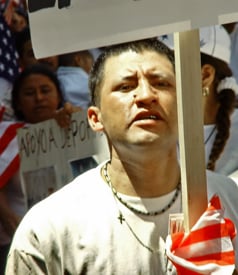Wednesday 28 July 2010
by: Andrea Nill | Think Progress | Report

A May Day immigration rally participant. (Photo: Joseph Voves)
This afternoon, in a long-awaited decision, 9th Circuit Judge Susan Bolton enjoined several major provisions of Arizona’s immigration law, SB-1070. While it was speculated that Bolton would block parts of SB-1070 relating to warrantless arrests and document requirements, the judge also ended up striking down the law’s most controversial and significant provision: the requirement that police check immigration status. Bolton blocked the following sections of SB-1070 arguing that “the United States is likely to succeed on the merits in showing that…[they] are preempted by federal law” and the “United States is likely to suffer irreparable harm” in the absence of an injunction:
Portion of Section 2 of S.B. 1070: Requires police to inquire about the immigration status of anyone they stop, detain, or arrest if they reasonably suspect the person is in the country illegally.
Section 3 of S.B. 1070: Criminalizes the the failure to apply for or carry immigration documents.
Portion of Section 5 of S.B. 1070: Criminalizes the solicitation, application for, or performance of work by an undocumented immigrant.
Section 6 of S.B. 1070: Authorizes the warrantless arrest of a person where there is probable cause to believe the person has committed a public offense that makes the person “removable.”


 Natalie Gray was apprehended by police during a demonstration at the temporary detention centre in Toronto's east end on June 28. (Submitted by Natalie Gray)
Natalie Gray was apprehended by police during a demonstration at the temporary detention centre in Toronto's east end on June 28. (Submitted by Natalie Gray)

